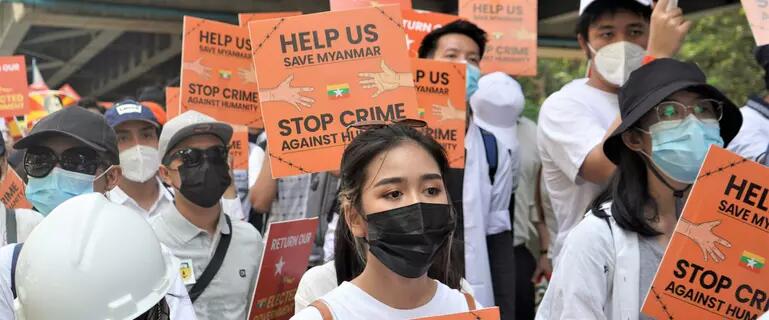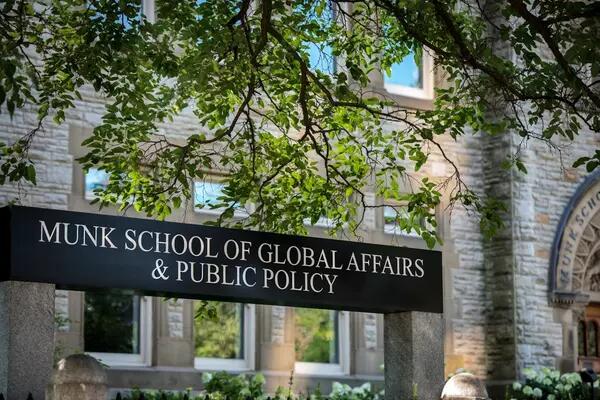Joseph Wong is University of Toronto’s Vice President, International; the Roz and Ralph Halbert Professor of Innovation, Munk School; and a professor of political science. In his latest book, "From Development to Democracy: The Transformations of Modern Asia" (Princeton University Press, 2022), he and co-author Dan Slater examine the economic development of twelve Asian countries, and the unique and similar ways they interact with and experiment with democracy as a result.
You state that most of the literature on democracy and development argues that democracy tends to emerge in a developing authoritarian country “through weakness” – that the regime must collapse under the pressures of development and reform, which sets the stage for democratic transition to occur. You frame the book, however, around the argument that democracy can also emerge “through strength” – that “authoritarian regimes can promote economic development and then concede democratic reforms without conceding defeat.” Can you give an example of this, and explain why your argument is such an important refinement of the conventional wisdom?
Conventional wisdom about the prospects of democratic transition tends to focus on collapsed regimes; we usually look for the prospect of democracy to arise from the ashes of collapsed autocratic regimes that have become so thoroughly delegitimated that there's no other option but to democratize. This often occurs through a bottom-up revolution of sorts. The Philippines is an example of this: the rise of the “people power” movement, the exile of Marcos, and the emergence of an unstable democracy from a completely collapsed regime.
But when you look at Asia and the countries that have democratized in the region, more often than not you actually see a strong, not weak, authoritarian regime conceding democracy. We refer to this as the paradox of democracy through strength: that autocratic regimes strong enough to withstand bottom-up pressures for democratization may in fact be in the best position to concede it. Signals are key to this process; in the book we are clear that an autocratic regime near or at the apex of its power needs to see the signals that it may be on the declining side of the graph, that they have entered the bittersweet spot and that this is the time to democratize with stability. The longer you wait, the more likely it is that you'll hurdle through that bittersweet spot and find yourself as an embittered autocratic regime, where you have no choice but to democratize, but from a position of weakness.
The best example of this is postwar Taiwan – indeed, this is the case I was thinking about when this book project began. In the 1980s, you had the Kuomintang (KMT), a brutal autocratic regime. The economy was strong, and the regime was certainly seen as legitimate. The KMT-led developmental state had orchestrated Taiwan's economic miracle, and there was no groundswell of political opposition in the streets. But the regime was receiving signals that it might be at the apex of its power, and the ruling party decided to preemptively start to liberalize the political system and concede democratic reforms – including lifting martial law, and even eventually introducing free and fair elections.
So, this was the puzzle: why does a regime concede democracy when it doesn't need to? And it struck both Dan (Slater, my co-author) and me that this was actually the predominant way in which most of the region had democratized. The Philippines was the exception; most democratic transitions happened when strong regimes concede democracy.
The case of the day is, of course, China. Let’s do a little thought experiment: if the Chinese Communist Party (CCP) were to concede democratic elections and invite opposition parties to form, it's pretty inconceivable that the CCP wouldn't actually win those elections, right? The CCP is seen as legitimate, as speaking for the nation, as having unified a country that was once fractured. It has been at the helm of, arguably, the most remarkable economic transformation in the history of humankind. So rather than thinking that democracy can only emerge from the collapse of the CCP, we could be looking for democracy to emerge from within a regime that's actually quite strong, and we should be incentivizing and encouraging the CCP and its leaders to consider this route.
The implications of the theory are quite profound and rather counterintuitive, but it goes a long way in explaining East and Southeast Asia's democratic rise.
This is not just a book about democratization, it’s also about development. The fragility or resilience of democracy rests in its ability to continue to deliver stability and development.- Joseph Wong
The book focuses on twelve Asian countries, and clusters them according to the strength of their historical and/or potential experiences of economic development and democracy. It is a complicated picture and one that, you argue, “requires a fundamental rethinking of Asian geography itself.” What unites each cluster, and how do these twelve countries and their interrelations prompt a rethinking of the region’s geography?
Each of the clusters reflects a certain kind of political economy. It’s not necessarily about GDP; some of the countries within a cluster are rich and some are poor. The ‘developmental statist’ cluster, made up of Japan, Taiwan and South Korea, is comprised of developmental state regimes that have strong ruling parties that oversaw industrial transformation, reduced poverty and eventually democratized. Developmental militarist regimes like Indonesia and Thailand, on the other hand, are governed by militaries and not by political parties. So unlike Japan, Korea, and Taiwan, in these cases you have strong regimes that govern without the apparatus of a political party, which we argue is consequential in terms of the likelihood that they're going to be able to successfully democratize. And indeed, we show that all three developmental militarist regimes do experiment with democracies, but with varying degrees of success.
Then you have developmental socialist regimes in a cluster – here, you have increasingly rich ones like China and very poor ones like Cambodia and Vietnam. But they are a cluster because they're all bound by a common ideological framework: one that does not find its traditions in Western liberalism or liberal capitalism, but are instead founded by revolutionary movements. Their primary concern is not electability – they don't have elections, after all, and they don't even have fraudulent elections. Rather their overarching concern is stability, and how to maintain it. They're convinced that if they aren't in power, the whole country would fall apart.
Developmental Britannia regimes are really interesting. These are regimes that are inheritors of British institutional legacies: courts, the rule of law and other governance mechanisms. But we argue that inheritance hems in these regimes, and that they lack the incentive or autonomy to democratize because these legalistic institutions are viewed as good enough to foster economic development.
We've got cases in both east and Southeast Asia. We have cases that are rich and poor. But each cluster is defined by a certain kind of political economic trajectory, and these have implications with respect to how likely democracy is to arrive.
In the introduction you say that modernization theory has long predicted that development leads to democracy – an assumption that several examples in your book disprove. Many people today feel that long-developed countries are currently at risk of backsliding out of democracy – is there anything in your study of Asian countries that can shed light on this? Can developmental Asia’s experiments with, and experiences of, democracy teach us anything about its fragility, even in long-developed and long-democratic regions?
This is not just a book about democratization, it's also about development. The fragility or resilience of democracy rests in its ability to continue to deliver stability and development. In each of our success cases, they're successful precisely because the regimes were able to deliver stable economic development. That sets the stage for democracy-through-strength to unfold. But when a political economy is unstable, when an economy is no longer delivering development, democracy becomes vulnerable. This is what we’re seeing in some younger democracies in parts of the world. This is what we saw in the democratic reversal of Russia decades ago, and some would say that we're seeing seedlings of this in some of the most well consolidated champions of democracy, like the U.S. The story of our book and, we think, of democracy, is equally a story about development.
You co-wrote the book with Dan Slater, a professor of political science at the University of Michigan. What led to you co-authoring this book in particular, and how did you work together?
I introduced myself to Dan at a conference twelve years ago. He had just given a paper on Indonesia and I'd given one on Taiwan. I said something like, “I think we are thinking along the same lines here. We should do something together.” That resulted in two days at a café in Madison, Wisconsin, during which we wrote an article – which became the basis of this book – that came out in the APSA journal Perspectives On Politics (PoP).
It took another year to complete the research and do the revisions for the PoP article, but I learned very quickly that our arguments and our take on the region more generally were in simpatico. But for the book, we needed to reconfigure the region and figure out how all the different cases worked together – it was a puzzle, and we struggled through it together. It was a productive partnership. We would ‘renovate’ each other’s chapter drafts, and the language and concepts would start to merge. As I reviewed the book now to talk about it with you today, I can't even remember – or tell – who wrote which sentences, paragraphs or first drafts.
You and Dan Slater spent the next ten years writing the book. Were the inevitable delays due to your incredibly busy schedules ultimately of some benefit to the book?
Absolutely. We were really lucky that it took so long! It’s such a big ideas book, and it took us some time to work these out. The world kept changing around us, and so we were constantly working to stay true to the argument but refining the framework to reflect what we were seeing. The timing couldn't have been more perfect because, for instance, five years ago, we might have speculated that Xi Jinping was consolidating power as a way to liberalize China. Now we see that that clearly wasn’t the case, and we were able to include that in the book. Also five years ago, Aung San Suu Kyi was in power in Myanmar, and it looked like the democratic experiment there might come to fruition. Today we know that it didn’t go that way – we see massive instability there, and the military is back in power. On a larger scale, the world right now is in the midst of a standoff between democracy and autocracy, and our book will be able to directly contribute to that debate, and offer a take on the prospects and fragility of democracy, and the very possible reversals of democratic experiments.
Princeton University Press saw that initial article and approached us to write the book. Dan asked me if I wanted to take them up on the invitation…and I actually said no. I had a lot going on at the time, and thought, I don't have time to write a whole book. But Dan came back to me and said, “what if we dedicated the book to Ed?” That, I couldn’t say no to. Dan and I both studied at the University of Wisconsin-Madison (Dan for his undergrad, me for my PhD), where we both had Edward Friedman as a professor, and he had a huge impact on the both of us. So we wrote the book, and dedicated it to our shared teacher and mentor, Ed Friedman.
If you’re an autocrat, you should hope that your fate is that of the KMT in Taiwan, and not that of Ceaușescu in Romania.- Joseph Wong

What is your hope for this book – what are the main insights that you would like the reader to garner about the interplay of development and democracy in Asia?
There is a belief among autocrats that they can stay in power forever – but forever is a long time. So an explicit takeaway from the book is that autocrats should democratize sooner rather than later. If you're an autocrat, you should hope that your fate is that of the KMT in Taiwan, and not that of Ceaușescu in Romania.
A second hope is that we stop demonizing China. When it comes to promoting democracy in China, this just isn’t helpful. It's not helpful to be an apologist for an autocratic regime, to be sure, but demonizing the CCP is not going to bring it more into the democratic fold. Rather, we need to look at how to incentivize and convince the Chinese regime that democracy does not necessarily spell its demise nor bring instability to China’s continued development.
Finally, I would really like this book to have an impact in Canada. The book is getting lots of attention in the U.S. – from think tanks to policymakers and academic institutions. Many there see the implications with respect to American foreign policy, and they’re really excited about what this book can contribute to such debates. But the fact is, one of the two authors of this book is Canadian, and he is at a prominent Canadian university, and I'd love for it to have an impact on the conversations here as well.
You wear many hats at U of T (Vice President, International; Roz and Ralph Halbert Professor of Innovation, Munk School; Professor, Political Science; founder of the Reach Alliance and Global Ideas Initiative) – is there anything about your work on democracy, development or Asia that links them all together?
Absolutely. It's a principled commitment to equity. My first book was on democracy and social policy, and from that first book to today, I've remained concerned about the distribution of political and economic power – whether it's in terms of health insurance benefits, the implications of innovation and industrial policies, or reaching the hardest of reach. I’m always asking: how do we create a more equitable distribution of political and economic power?
This has always informed my research, and it applies equally to my academic leadership roles. As the University’s Vice President, International, I’m constantly asking how we can create a more equitable global stage to collaborate with smart and insightful people from around the world? And how do we do the same for the students who come here to U of T, students whose diversity we celebrate? And how do we fulfill a commitment to our students that when they graduate they will be equipped to have a principled impact on the world? It's not a real stretch to connect the dots in my work as a researcher, teacher, and leader.



